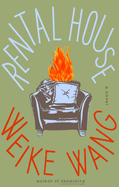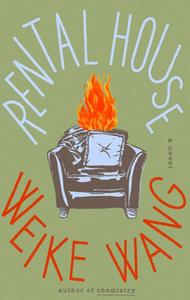
 A New York couple in their late 30s navigate seismic cultural and socio-economic differences in Weike Wang's intimate drama, Rental House. A PEN/Hemingway Award-winner, Wang thematically centers her third novel on a post-pandemic family vacation, as parents and adult offspring who haven't met for some years cautiously reunite. Against the scenic backdrop of a holiday rental in Cape Cod and later in the Catskills, she masterfully probes the inner workings of a contemporary marriage, exposing cracks that linger long after its foundation settled.
A New York couple in their late 30s navigate seismic cultural and socio-economic differences in Weike Wang's intimate drama, Rental House. A PEN/Hemingway Award-winner, Wang thematically centers her third novel on a post-pandemic family vacation, as parents and adult offspring who haven't met for some years cautiously reunite. Against the scenic backdrop of a holiday rental in Cape Cod and later in the Catskills, she masterfully probes the inner workings of a contemporary marriage, exposing cracks that linger long after its foundation settled.
Nate and Keru live in Manhattan with their sheepdog, Mantou. He's a scientist in academia and she's in consulting, earning far more than her husband. Keru is a Chinese American raised with a strict, unforgiving work ethic, a product of her parents' immigrant dreams and sacrifices. Nate, meanwhile, escaped his rural, conservative "white trash" upbringing "at the foothills of the Blue Ridge Mountains" to attend college on financial aid.
The novel opens as the couple's parents descend on their Cape Cod vacation rental for staggered visits. Nate adapts easily to Keru's parents--they mostly ignore him and his broken Mandarin to focus with their customary intensity on Keru. She is like a pressure-cooker during their visit. On the other hand, Nate's mother laments her son's emotional distance and his elitist tendencies; toward Keru she is clumsily attentive yet wary. As readers discover in a tense exchange with a beachgoer, she is protective of her, too.
Five years later, Wang's protagonists are on vacation in the Catskills. With skillful precision, Wang (Chemistry) observes them through the lens of their vacationing neighbors, Mircea and Elena, offering tantalizing glimpses into who Keru and Nate might have been had they not married one another. Mircea and his wife, Elena, have a young son; their relaxed contentment irritates Keru and Nate and leaves them vaguely dissatisfied with their lives. Mantou is on anti-anxiety and nausea pills and although the vet can't figure out what truly ails him, readers might notice Mantou's owners' numerous concerns reflected in their sweet dog.
The Catskills trip ends eventfully with an unexpected visitor and a confrontation that marks a new direction in the couple's insulated lives. Keru wants more familial connection, even if it means she must carry the burden of Nate's deeply flawed brother Ethan and his constant need for money. As Wang succinctly points out, "Marriage is fifty-fifty, but who said that? Who believes this to be true?" --Shahina Piyarali
Shelf Talker: A New York couple in their late 30s are at the center of this masterful marriage portrait by the PEN/Hemingway award-winning author of Chemistry.

